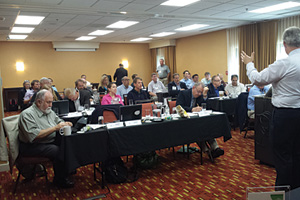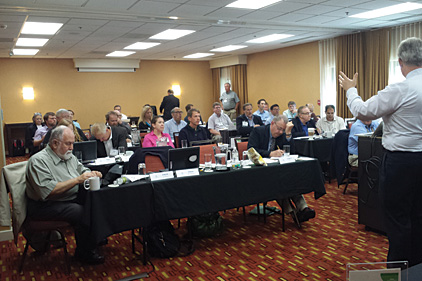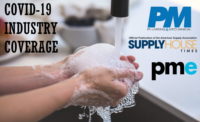
|
| The ASPE Water Resue Workshop was held June 25-26 at the Chicago Courtyard Marriott in Rosemont, Ill. More than 35 industry professionals attended the event in hopes of advancing water resuse processes including rainwater harvesting, stormwater and irrigiation applications. Photo by Nadia Askar/pme |
More than 35 people attended the Water Reuse Workshop that took place June 25-26 at the Chicago Courtyard Marriott in Rosemont, Ill. The workshop, sponsored by ASPE, NSF and the Water Quality Association, began with a welcome from ASPE Executive Director/CEO Jim Kendzel.
“We are here to talk about water reuse in general, including rainwater catchment systems, stormwater, irrigation and everything in between,” he said.
Kendzel added the ultimate goal was to create a water reuse strategy in the United States. Other goals include:
- Develop an understanding of the current programs that exist for standards and codes covering water reuse;
- Begin to understand the gaps and issues that exist when looking at the current situation compared to the long-term objectives;
- Start to develop strategies for resolving these gaps and issues; and
- Determine the role of this group in relation to other activities underway and determine where this group fits in the overall scope of water resuage.
The event’s keynote speaker, Dr. Joseph Cotruvo, president of Joseph Cotruvo and Associates, spoke about the history of potable water reuse — where it all began and how it has progressed — and offered ideas on approaches to produce guidelines that assure safety.
“There are many different kinds of reuse, but the key thought is to remember about all of them is ‘fit for purpose,’” Cotruvo said. “You are not trying to make distilled water for irrigation. You are making water of a particular quality that is appropriate for that particular use. The challenge is defining and assuring the appropriate goal, technology and quality.”
There to discuss the current standards and codes were:
- Bob Boulware – ARCSA/ASPE 63: Rainwater catchment systems;
- Neal Shapiro – ARCSA/ASPE 78: Stormwater harvesting systems;
- Travis Tsunemori – ASABE standards;
- James Majerowitz – IAPMO Green Plumbing & Mechanical Code Supplement and graywater treatment systems;
- Fred Grable – ICC International Green Construction Code and ICC/CSA Standard for Rainwater Collection System Design and Installation;
- Tom Bruursema – NSF/ANSI: Onsite water reuse and other relevant NSF standards; and
- Corey Enck – USGBC LEED standards.
The second day began with Kendzel giving an overview of ISO Technical Committee 282, the scope of which covers standardization of water reuse of any kind and any purpose, centralized and decentralized, and the technical, economic, environmental and societal impacts. Excluded from the scope are the limits of allowable water quality, TC 224 and the methods of measurement of water quality.
Afterward, presentations were given by different association members on what is and is not needed from the current standards and codes. Presenters were:
- Melissa Meeker – WaterReuse Association;
- Sam Perry – American Society of Drinking Water Administrators;
- Sara Simmonds – National Environmental Health Association;
- Eric Yeggy – Water Quality Association; and
- David Crawford – American Rainwater Catchment System Association.
Throughout the entirety of the two-day workshop, gaps, issues and concerns were brought up and taken note of for later discussion. Among these issues are a need for a common language in regard to definitions; uniform quality standards for non-potable reuse; fragmented reclaimed water criteria; the effects on systems downstream from reuse of water related to the system; rainwater/stormwater standards; and the question of ownership — who is responsible in making sure everything works the way it should?
After understanding the gaps/issues, attendees discussed what developments were needed for the future. “The point of this right now is to point out the gaps, not to find solutions, but to identify the issues and share them with everybody,” Kendzel said.




